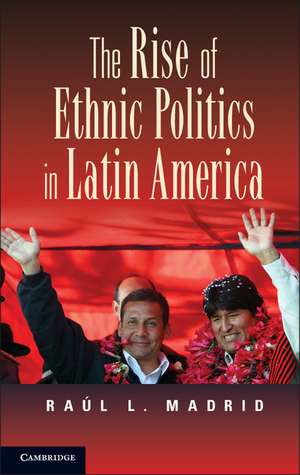The Rise of Ethnic Politics in Latin America
Autor Raúl L. Madriden Limba Engleză Hardback – 25 mar 2012
| Toate formatele și edițiile | Preț | Express |
|---|---|---|
| Paperback (1) | 234.86 lei 6-8 săpt. | |
| Cambridge University Press – 29 mar 2012 | 234.86 lei 6-8 săpt. | |
| Hardback (1) | 701.53 lei 6-8 săpt. | |
| Cambridge University Press – 25 mar 2012 | 701.53 lei 6-8 săpt. |
Preț: 701.53 lei
Preț vechi: 815.72 lei
-14% Nou
Puncte Express: 1052
Preț estimativ în valută:
134.23€ • 140.66$ • 110.97£
134.23€ • 140.66$ • 110.97£
Carte tipărită la comandă
Livrare economică 11-25 aprilie
Preluare comenzi: 021 569.72.76
Specificații
ISBN-13: 9780521195591
ISBN-10: 0521195594
Pagini: 256
Ilustrații: 12 b/w illus. 7 tables
Dimensiuni: 161 x 241 x 18 mm
Greutate: 0.48 kg
Editura: Cambridge University Press
Colecția Cambridge University Press
Locul publicării:New York, United States
ISBN-10: 0521195594
Pagini: 256
Ilustrații: 12 b/w illus. 7 tables
Dimensiuni: 161 x 241 x 18 mm
Greutate: 0.48 kg
Editura: Cambridge University Press
Colecția Cambridge University Press
Locul publicării:New York, United States
Cuprins
1. Introduction; 2. Ethnicity and ethnopopulism in Latin America; 3. The ascent of the Movimiento al Socialismo in Bolivia; 4. The rise and decline of Pachakutik in Ecuador; 5. Ethnopopulism without indigenous parties in Peru; 6. The failure of indigenous parties outside of the Central Andes; 7. Indigenous parties and democracy in the Andes; Conclusion: 8. Theoretical implications.
Recenzii
'This is a well-executed and timely book. Madrid offers a novel theory about the success of ethnic parties under conditions of ethnic fluidity and intra-ethnic group fragmentation. Empirically, the author impressively triangulates qualitative and quantitative evidence from in-depth country studies to illustrate his story. The book contributes both to the general theoretical literature about the success of ethnic parties and the literature specifically focusing on Latin America. The policy implications drawn out in the last chapter and, to a lesser degree, in the substantive chapters are interesting and thought provoking. This book is an excellent read for anyone interested in ethnic politics in Latin America and beyond.' Jóhanna K. Birnir, University of Maryland
'In this thoroughly researched and well-crafted book, Raúl Madrid upends existing explanations for the rise and success of indigenous parties in Latin America while also challenging the broader scholarship on ethnic politics. Madrid convincingly shows that neither institutional change nor social movements are the primary drivers behind the success of indigenous parties; what matters most is a strategy of inclusive populism.' Christina Ewig, University of Wisconsin, Madison
'The Rise of Ethnic Politics in Latin America makes a major contribution to the study of ethnic politics. Madrid reconceptualizes ethnic mobilization in a way that takes seriously the mixed and fluid character of ethnic identities in Latin America, and he shows that ethnic parties only succeed in the region when they make inclusive appeals that go beyond ethnicity. Moreover, the book offers the most sophisticated analysis I have seen of the impact of ethno-populist movements on democracy in Latin America. Madrid's book helps us understand the distinct character of ethnic politics in Latin America, but I suspect it will travel beyond Latin America. I recommend it not only to students of Latin American politics, but to anyone interested in ethnic politics.' Steven Levitsky, Harvard University
'In this thoroughly researched and well-crafted book, Raúl Madrid upends existing explanations for the rise and success of indigenous parties in Latin America while also challenging the broader scholarship on ethnic politics. Madrid convincingly shows that neither institutional change nor social movements are the primary drivers behind the success of indigenous parties; what matters most is a strategy of inclusive populism.' Christina Ewig, University of Wisconsin, Madison
'The Rise of Ethnic Politics in Latin America makes a major contribution to the study of ethnic politics. Madrid reconceptualizes ethnic mobilization in a way that takes seriously the mixed and fluid character of ethnic identities in Latin America, and he shows that ethnic parties only succeed in the region when they make inclusive appeals that go beyond ethnicity. Moreover, the book offers the most sophisticated analysis I have seen of the impact of ethno-populist movements on democracy in Latin America. Madrid's book helps us understand the distinct character of ethnic politics in Latin America, but I suspect it will travel beyond Latin America. I recommend it not only to students of Latin American politics, but to anyone interested in ethnic politics.' Steven Levitsky, Harvard University
Notă biografică
Descriere
Explores why indigenous movements have recently won elections for the first time in the history of Latin America.












